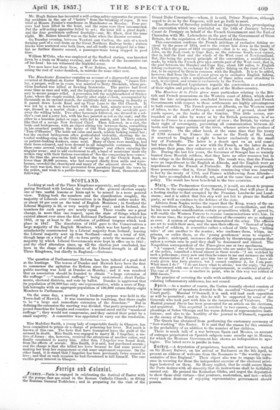SCOTLAND.
Looking at each of the Three Kingdoms separately, and especially comparing Scotland with Ireland, the results of the general election supply one or two useful lessons or hints apt to be missed in a more general view. Takirig both the numbers and the classification roughly, the majority of Liberals over Conservatives is in England rather under 80, or about 16 per cent on the total of English Members ; in Scotland the Liberal Majority is 25, or very nearly 50 per cent; and in Ireland, the numbers for each party are nearly equal. These results are a great change, in more than one respect, upon the state of things which has existed alined ever since the first Reformed Parliament was dissolved in 1835, or up at least to the confusion of political tongues which took place in 1847. The dissolution of 1835 gave to the Conservatives a large majority of the English Members, which was but barely and unsatisfactorily counteracted by a Liberal majority from Ireland ; leaving the Liberal majority sent up from Scotland—small on a total of 658, though large on a total of 53—to form pretty nearly the measure of the majority by which Liberal Governments were kept in office up to 1841; and the chief alteration since, up till the election just concluded, has been in the shape of a diminution of the Liberal strength in all the Three Kingdoms, but chiefly in England.—Scotsman.
The question of Parliamentary Reform has been talked of a good deal at the hustings. The towns of Dundee and Ilawick have been the first to commence the agitation for Reform since the general election. A public meeting was held at Dundee on Monday ; and it was resolved that an association should be founded to obtain "a large extension of the suffrage" —" manhood suffrage" being understood ; short Parliaments, electoral districts, and vote by ballot. Dundee is aggrieved that its population of 90,000 has only one representative, while a score of English boroughs with an aggregate population of 100,000 return thirty-eight Members to Parliament.
On the same day, a meeting for a kindred purpose was held in the Town-hall of Hawick. It was unanimous in resolving, that there ought to be "a large and immediate extension of the franchise." But in defining the extension the meeting was divided. One party proposed a fivepound franchise for burghs and counties : a second stood out for "manhood suffrage" ; they would not compromise, and they carried their point by a small majority. A committee was appointed to carry out the resolution.
Miss Madeline Smith, a young lady of respectable family in Glasgow, has been committed to prison on a charge of poisoning her lover. Not much is known of this case. The facts that have transpired leave the guilt of the accused in doubt. Miss Smith was engaged to marry M. l'Angelier, a native of Jersey : she, however, received the attentions of another suitor, and finally consented to marry him. After this, l'Angelier was found dead, from the effects of arsenic. Miss Smith, it is said, had purchased arsenic ; and the charge is that she killed her lover because he had some power of making her keep her engagement or risk some unpleasant exposure. On the other band, it is stated that l'Angelier has been previously twice crossed in love ; and that on each occasion he had threatened to kill himaelf. The case excites great interest in Glasgow.


























 Previous page
Previous page